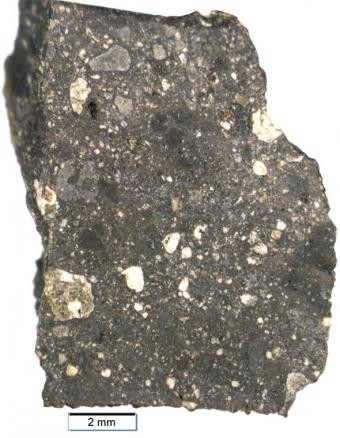4.4 billion-year-old Martian meteorite is a piece of the planet's crust, says study

New research on a unique 4.4 billion-year-old Martian meteorite reveals it to be a piece of the planet's crust, the first of its kind to reach Earth.
The Brown University study suggests the Martian landscape is made largely of such composite rocks rather than the igneous type.
NWA 7034, the meteorite nicknamed Black Beauty, found a few years ago in Morocco, is a breccias or a mashup of different rock types welded together in a basaltic matrix. Some of its components match rock samples analysed by the Mars rovers.
Spectroscopic measurements of the meteorite match orbital measurements of the Martian dark plains, areas where the planet's coating of red dust is thin and the crust lies exposed.
Black Beauty is representative of the "bulk background" of rocks on the Martian surface, says Kevin Cannon, a Brown University graduate student and lead author of the new paper.
"This is showing that if you went to Mars and picked up a chunk of crust, you'd expect it to be heavily beat up, battered, broken apart and put back together," Cannon said.
The data also corroborates with the fact that Mars abounds in 400,000 impact craters greater than 1 km in diameter, pointing to impacts that broke up the crust which then came together as the composites.

The research, co-authored by Jack Mustard from Brown and Carl Agee from the University of New Mexico, is published in Icarus.
Analysis in 2011 had shown that Black Beauty was unlike any Martian meteorite ever found, most of which belong to igneous rocks made from cooled volcanic material.
All other Martian rocks classified as SNC meteorites (shergottites, nakhlites, or chassignites) found on Earth differ in their spectral signal from that of the Martian surface.
The spectral match of Black Beauty with the dark plains suggests the region is dominated by brecciated rocks.
Studies on Martian meteorites have suggested the presence of water and hence, microbial life at some time in the history of the planet. In fact, some scientists believe that life on Earth was delivered by Martian meteorites carrying life-essential water and minerals like molybdenum.
© Copyright IBTimes 2025. All rights reserved.





















